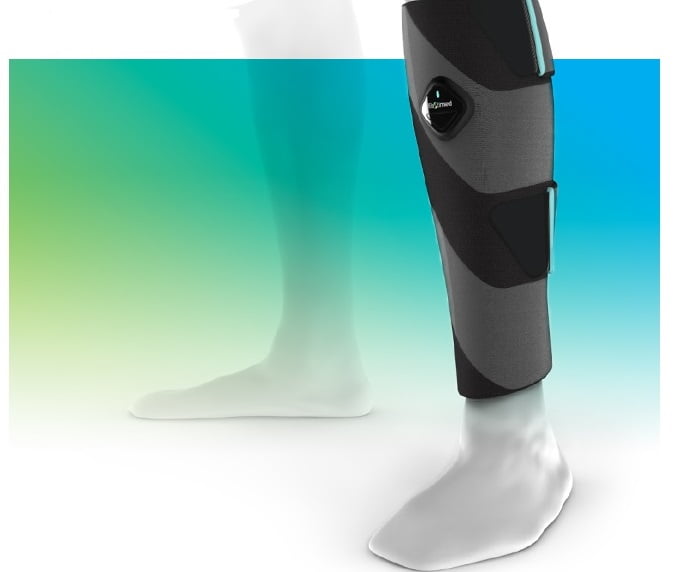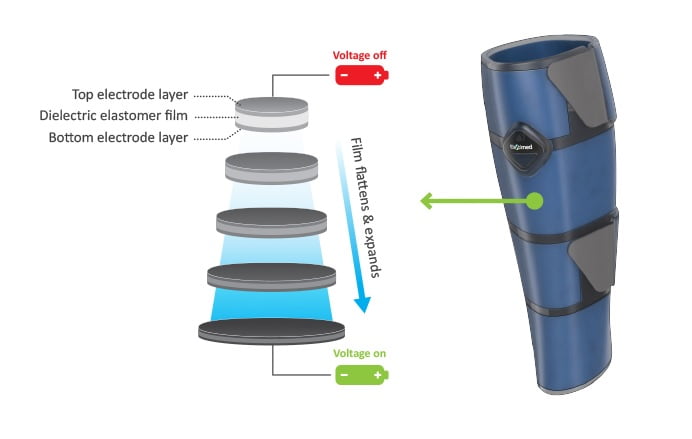An Israeli sock startup recently raised a $1 million investment from private investors and the Israeli Innovation Authority. That might be a jarring sum for a company that makes ubiquitous foot garments, but Elastimed doesn’t produce just any socks. The northern Israel-based startup has developed a “smart” sock — a wearable medical device that helps improve circulation in the legs for treating venous and lymphatic diseases.
ElastiMed’s sock uses battery-operated technology to activate electric pulses that compress and massage the legs to stimulate circulation. The pulses mimic contractions in the calf muscles that in turn increase blood flow.
SEE ALSO: Intelligent Socks Paired With Smartphones Can Save Diabetics’ Feet
The smart sock is aimed at athletes, pregnant women whose feet and legs often swell from fluid retention, and patients suffering from chronic wounds and other disorders such as varicose veins, Lymphedema (damage to the lymph nodes), and venous thrombosis. Left untreated, some of the conditions can lead to significant pain, itching, swelling and other dangerous medical complications.
Elastimed, founded in 2015 by Omer Zelka, also the company’s CEO, sought to develop a device that was comfortable, easy to wear and did not hinder daily life.
Zelka tells NoCamels: “I’m a tech junkie. I used my background in electrical engineering to set up a lab in my small Tel Aviv apartment to develop the technology” for the electric pulses before deciding on the application. Zelka says he had a business model for a number of different applications, but after speaking with experts in the medical field and their patients and noting the demand, he realized “there was a strong need.”
Elastimed’s technology, according to the company, “manipulates Electro Active Polymers (EAPs) into thin, linear actuators” that then “expand and contract when stimulated by an electric field.”
Elastimed’s device “integrates these smart EAP bands by wrapping them around the leg, causing them to squeeze and massage the patient’s leg, mimicking rhythmic calf muscle contractions to promote fluid movement in the leg,” and “increasing healing efficiency, while requiring low energy consumption.”
‘Not a compression garment’
Compression garments have been around for quite some time and are successful treatments to some symptoms, but a common complaint, according to Zelka, is that they are uncomfortable and difficult to put on and take off. A 2007 study by the University of Mississippi Medical Center and River Oaks Hospital found that of patients being treated for chronic venous disease (CVD) with compression stockings, just 21 percent used them on a daily basis, with 12 percent using them most days, and four percent even less than that. The majority, 63 percent, did not use the stockings at all or stopped using them after a trial period.
Sign up for our free weekly newsletter
SubscribeWith CVD in the lower limbs one of the most widespread diseases in the Western world and some venous thrombotic diseases affecting 1 in 1,000 people, Zelka is hoping the market is ripe for his smart socks.
“Solving the noncompliance problem and offering patients a highly effective, easy-to-wear, and comfortable device will mean a real breakthrough in this field. With such a huge market (estimated at $2.2 billion in 2014 and growing by 5% annually), the need for better solutions is clear,” he added.
While other solutions exist, such as pneumatic compression, which involves wearing inflated cuffs that mimic muscle contractions, Zelka says they can be cumbersome, noisy, limit mobility, and expensive, costing up to $1,500.
Zelka declined to tell NoCamels how much Elastimed’s product would cost but indicated it would be “substantially more affordable and more comfortable”, than pneumatic compression therapy. The garment is also lightweight and can be worn throughout the day, according to Elastimed.
SEE ALSO: Innovation Nation: Twelve Israeli Inventions That Are Changing The World
The company is now focused on clinical trials over the next several months and applying for regulatory approval in Europe and the United States, after which it aims to have the products market-ready by 2019, Zelka tells NoCamels.
Elastimed also has its eyes set on developing additional applications using the technology, including “compression devices for different body parts, smart tourniquets, active bandages, haptic devices, [and] smart clothing,” the company’s website indicates.
Related posts

Editors’ & Readers’ Choice: 10 Favorite NoCamels Articles

Forward Facing: What Does The Future Hold For Israeli High-Tech?

Impact Innovation: Israeli Startups That Could Shape Our Future






Facebook comments